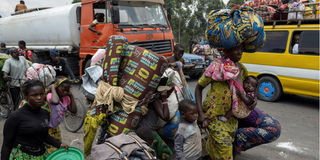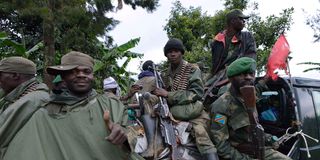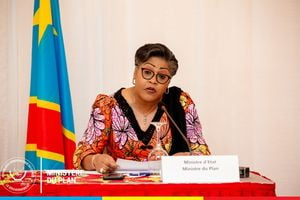
Congolese people carry their belongings as they flee from their villages around Sake in Masisi territory, following clashes between M23 rebels and the Armed Forces of the Democratic Republic of the Congo on February 7, 2024.
The Democratic Republic of Congo (DRC) is reaching back for the much-avoided death penalty in its latest bid to dissuade rebels in the east of the country to lay down the arms, and for the soldiers in the army to toe a loyal line of patriotism.
But using death as a weapon is both controversial as is likely to raise debate on whether Kinshasa will be willing to reintegrate those who change their ways after killing in the armed rebellions.
Rose Mutombo, DRC’s outgoing Justice Minister published a circular last month to lift a moratorium on the death penalty imposed in 2003. Kinshasa still has on its law books legislation in force that provides for the death penalty for certain offences. That death penalty, although pronounced by Congolese courts, is no longer carried out.
Now the Congolese government says all those guilty of "treason; espionage; participation in armed gangs; participation in an insurrectionary movement; crimes against humanity; war crimes; desertion to the enemy; the crime of genocide; military conspiracy; rebellion resulting in the death of the authority against which the acts of rebellion are committed" should be sentenced to death.
In addition, those involved in acts of rebellion, refusal of obedience to march against the enemy; violation of orders in the presence of the enemy or an of an armed band; willful abstention by a unit commander from carrying out a mission relating to war operations for which he has been charged will also be punishable by death.
“For the past thirty years, the eastern part of our country has been plagued by recurrent armed conflicts, often orchestrated by foreign states, which sometimes benefit from the complicity of some of our compatriots,” Mutombo’ s circular indicated.
“These acts of treachery or espionage have exacted a heavy toll on both the population and the Republic in terms of the immense damage suffered. Over the same period, we have also noted the exponential growth in most of our major urban centres of the phenomenon of banditry of great cruelty, sowing terror and desolation and sometimes causing death in communities.”
In the DRC, however, the existence of the death penalty or lack of implementing it have both been controversial in the past. In 2001, after the assassination of Laurent Desire Kabila, Kinshasa rounded up members of its military said to have been used by outsiders to kill their President.
After rushed trials, 13 soldiers were convicted of a plot to overthrow their government. They were sentenced to death which was later commuted to life. At the time, then Justice and Human Rights Minister Ntuba Luaba said none of the men would be executed.
Yet two years later, another group of 15 men were executed. It would turn out later that some of the men had been executed by mistake.
Even those whose death sentence was commuted would later claim they endure torture for the years they were in jail. One of the men, Captain Itongwa Ngiringa Écho, who led Kabila Snr’s guard brigade would speak publicly about his torture in spite of the commuted deaths sentence.
His and others’ trial were criticised by the African Commission for Human Rights. Itongwa was incidentally pardoned by President Felix Tshisekedi in December 2020 although the government argued then that it was decongesting jail cells to deal with Covid-19.
“They said: ‘you’re small fry, we want the person behind this.’ I couldn’t tell them anything, so they tied me up and beat me. By the time they left me, I could barely breathe. I didn’t know it then, but I would spend the next 20 years in jail,” he said in an interview with SOS-Torture Network, a website that collects data on human rights violations of political prisoners, after he was freed.
Death sentence itself is a question of justice, rather than a security tool. Amnesty International, one of the most vocal rights groups against death penalty promptly opposed Mutombo’s circular.
“The government’s decision to reinstate executions is a gross injustice for people sentenced to death in the Democratic Republic of Congo and shows a callous disregard for the right to life. It is a huge step backwards for the country and a further sign that the Tshisekedi administration is backtracking on its commitment to respect human rights,” said Tigere Chagutah, Amnesty International’s Regional Director for East and Southern Africa.
“Whether those who have been sentenced to death are in the national army or police, in armed groups or have been involved in gang violence, everyone has a right to life and for that right to be protected.
Rights groups argue that hundreds of suspects would be in danger as the death penalty could be weaponised through the justice system to settle political scores.
“With an inefficient and ineffective justice system, which President Tshisekedi has himself described as ‘sick’, the government’s appalling move means many innocent people are now at risk of execution. This is even more alarming given the ongoing crackdown on political opponents, human rights activists and journalists,” Amnesty argued in a position statement last week.
In the past, death sentences were meted out on those seen as politically incorrect. It is a relic of the colonial past when Belgian administrators hunted down religious leaders or influential tribal leaders. However, executions in the DRC are only legally allowed if the President signs a death warrant.
Last month, the DRC government has also stressed that the death penalty will also be applied to bandits when their actions result in death. In the DRC's major cities, notably Kinshasa and Lubumbashi, gangs operating with machetes, killing, raping or amputating the legs and arms of citizens, are on the increase.
According to Rose Mutombo, "traffickers, terrorists and bandits" have, for years, taken advantage of the moratorium on the death penalty, which was "in their eyes
a guarantee of impunity because, even when they were irrevocably sentenced to death, they were assured that this sentence would never be carried out against them".

Democratic Republic of Congo Army soldiers gesture in this file photo at the foot of Chanzu hill, in the eastern North Kivu region that was one of the M23 rebels' last stands.
The Minister of Justice argues that the aim is to "rid our country's army of traitors on the one hand, and to stem the resurgence of acts of terrorism and banditry on the other.”
This is what President Félix Tshisekedi calls "separating the wheat from the chaff.”
“There are traitors in our army. Today we are fighting both a visible enemy, Rwanda, and an invisible one, those who have infiltrated our ranks", the Congolese president declared in March.
In the Democratic Republic of Congo, a number of civil society organisations and even some politicians have also expressed their concerns about the reinstatement of capital punishment in the country.
In a statement, the Réseau d'éducation civique au Congo (RECIC) believes that the death penalty is not an effective means of combating crime and treason within the army. It recommends instead that the government abolish the death penalty and apply the alternative penalty of "life imprisonment".
“No country in the world that applies the death penalty has succeeded in eradicating, let alone reducing, crime," said Jean Michel Mvondo, Executive Secretary of RECIC.
In a statement, the European Union made clear its "firm and unequivocal opposition to the use of the death penalty at any time and in any circumstances. Capital punishment violates the inalienable right to life and is incompatible with human dignity. The death penalty is not an effective deterrent to crime and makes any miscarriage of justice irreversible".

War-displaced women gather at a small roadside market in the Kalinga IDP camp, near the town of Masisi Centre, March 27, 2022, in North Kivu province, eastern Democratic Republic of Congo.
The Catholic Church, which is very influential in the DRC, notes that the authorities' desire to "rid the army of traitors", spies, criminals and other criminals in the country can in no way justify the death penalty. This church is calling on the authorities to get their act together.
Donatien N'shole, spokesman for the Congolese bishops, said: "Our country is taking a step backwards in terms of defending life, even though it has signed international agreements to abolish the death penalty. For several years now, our country's justice system has been plagued by corruption, influence peddling, miscarriages of justice and settling of scores.
“The reinstatement of the death penalty reinforces the trivialisation of human life. The death penalty is unacceptable because it violates human inviolability and dignity. We clearly reject the use of the death penalty.”
For the time being, the Congolese government persists. "We are in a particular context where millions of Congolese civilians are dying. If we have to reinstate the death penalty to stop these deaths, we have no choice”, Patrick Muyaya, government spokesman and Minister of Communication said.
All this is happening in a context where the M23 rebellion has been strengthened by the Alliance Fleuve Congo (Congo River Alliance), recently created by former electoral commission chairperson Corneille Nangaa, who says he wants to overthrow President Félix Tshisekedi. He has received a number of endorsements and support from politicians in Kinshasa and elsewhere.








